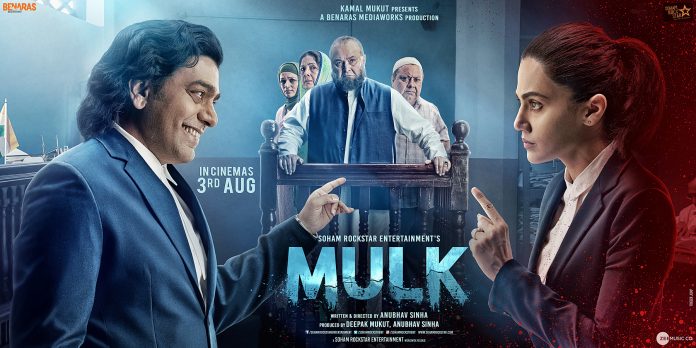Soham Rockstar Entertainment and Benaras Mediaworks’ Mulk (UA) is the story of a Muslim family living in Lucknow and, through that family, the story of how prejudices can make life hell for Muslims in India.
Murad Ali Mohammed (Rishi Kapoor) is a respected lawyer who lives in Lucknow with his wife, Tabassum (Neena Gupta), younger brother, Bilal (Manoj Pahwa), sister-in-law, ‘Chhoti’ Tabassum (Prachee Shah Paandya), nephew, Shahid (Prateik Smit Babbar), and niece, Aayat (Vartika Singh). Murad Ali Mohammed’s son, Aftab (Indraneil Sengupta), and his Hindu lawyer-wife, Aarti (Taapsee Pannu), live abroad. Aarti has come visiting the family, deciding to stay away from her husband who wants their child, as yet unborn and even not conceived, to follow Islam, something which the progressive Aarti feels, does not even merit discussion. The level-headed Aarti continues to give her in-laws the same respect and love despite the tension with her husband. Ditto for the in-laws.
To the shock of the entire family, Shahid is named as one among three terrorists who’ve caused bomb blasts in Allahabad, resulting in deaths of innocent people. Nobody in the family even had an inkling that Shahid had, right under their nose, become a jehadi, having been initiated into terrorism by Mehfooz Alam (Sumit Kaul). Anti-terrorist squad inspector Danish Javed (Rajat Kapoor) shoots Shahid on sight and the dead body is brought to Lucknow. Shahid’s respectable family is so distraught at the thought that one among them had become a terrorist that it refuses to accept the corpse.
Soon, Shahid’s father, Bilal, is taken by the police for interrogation. After a gruelling session of questioning, the police arrest him. In court, public prosecutor Santosh Anand (Ashutosh Rana) tries to prove that Bilal was aware of son Shahid’s terrorism activities and was himself involved in them. Murad Ali Mohammed defends brother Bilal in court but before he knows it, he too is accused by the public prosecutor of terrorism. Shaken and dejected at the prejudice against Muslims, the old Murad Ali asks daughter-in-law Aarti to become Bilal’s lawyer in court.
Is Aarti able to defend Bilal and Murad Ali? Are they pronounced guilty or acquitted?
Anubhav Sinha has written a nice and thought-provoking story about a Muslim family which is looked down upon as a family of terrorists because of one black sheep in the family. While being relevant and topical, the story also tackles the larger issue of prejudice against members of the minority community in India. His screenplay is very engaging in the first half. The second half is mostly devoted to the courtroom drama. In the courtroom drama, while trying to extrapolate the story of the Mohammed family to the story of Muslims in India in general, Sinha does lose his grip in parts but he gets in control in the climax again. Had the courtroom drama had far more fire and many clap-trap moments, the impact would’ve been greater. In trying to take the macro view, the screenplay somewhere is unable to do justice to the pain and sufferings of the Mohammed family. Nevertheless, the drama does keep the viewers engaged. However, it would appeal mainly to the class audience because it becomes a drama of a macro issue after some time. Had Anubhav Sinha not left his grip on the state of the Mohammed family and milked the emotions in that space, the film would have become a fare for the masses and family audiences too. Also, the courtroom drama looks a bit simplistic and often one-sided – when public prosecutor Santosh Anand argues, it’s just his viewpoint and, likewise, when Aarti argues, it’s just her version. The audience would’ve enjoyed the courtroom drama far more had there been at least seven to ten clapworthy scenes of one-upmanship in the court arguments. The judgement pronounced by the judge (Kumud Mishra) is superbly worded – entertaining, yet so weighty. Anubhav Sinha’s dialogues are excellent.
Rishi Kapoor is extraordinary, as always. He lives the character of Murad Ali Mohammed who feels so helpless and marginalised because of his religion. His nuanced performance is worthy of high praise. Taapsee Pannu delivers a mature and superbly understated performance as Aarti Mohammed. Ashutosh Rana is splendid as public prosecutor Santosh Anand. His antics in the court are enjoyable. Rajat Kapoor delivers a decent performance as Danish Javed. Kumud Mishra is absolutely delightful as the judge. Manoj Pahwa delivers a fantastic performance as Bilal. His scene in jail with elder brother Murad Ali will make the weak-hearted cry. Prateik Smit Babbar is good as Shahid Mohammed. Neena Gupta shines in the role of Murad Ali’s wife, Tabassum. Prachee Shah Paandya is effective as Bilal’s wife, ‘Chhoti’ Tabassum. Vartika Singh makes her presence felt in the role of Aayat. Sumit Kaul leaves a mark as Mehfooz Alam. Ashrut Jain is good as Rashid. Indraneil Sengupta is alright in a brief role as Aftab. Atul Tiwari, as Murad Ali’s close Hindu friend, is very effective. Anil Rastogi, Vinay Ghoshal, Ehsaan Khan, Ehsannur Rehman Khan, Shriya Pilgaonkar, Udayveer Singh Yadav, Manoj Dutt, Paromita Chatterjee and the rest lend fair support.
Anubhav Sinha’s direction is good. He has handled the subject with sensitivity. Prasad Sashte and Anurag Saikia’s music and Shakeel Azmi’s lyrics are appealing. Mangesh Dhakde’s background music is very impactful. Ewan Mulligan’s cinematography captures the sombre mood of the drama with elan. Nikhil Kovale’s sets are realistic. Riyaz-Habib’s action and stunt scenes are good. Ballu Saluja’s editing is sharp.
On the whole, Mulk is a purposeful entertainer and has the potential to do fair business but its dull start and the dual oppositions of Fanney Khan and Karwaan this week will tell on its business. The critical acclaim it wins will be far more rewarding than the box-office revenues. Collections should definitely pick up by positive mouth publicity.
























